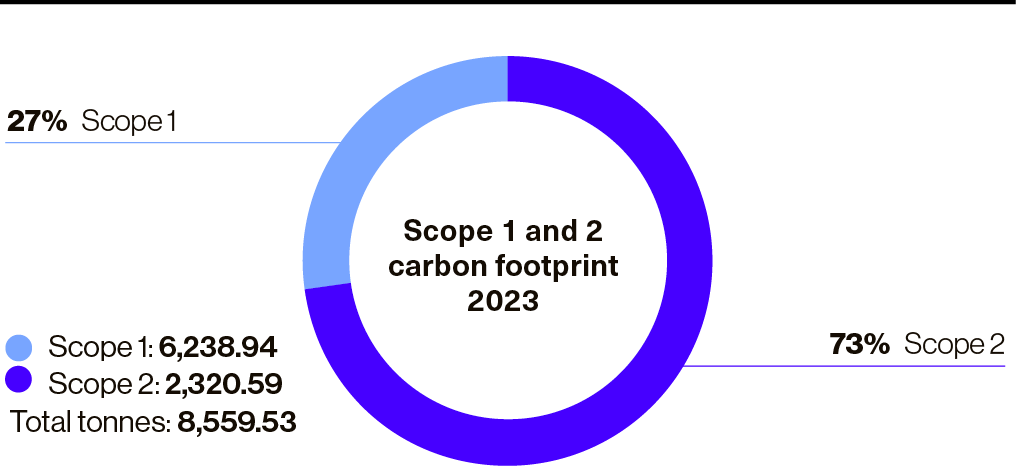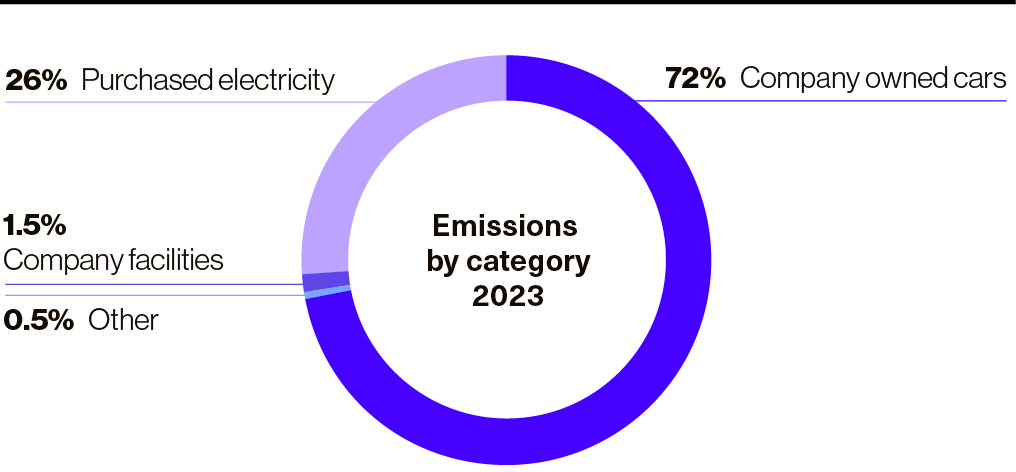Our climate commitment
Environmental matters and greenhouse gas emissions
Our goals and policies
Our ambition to reach net zero for Scope 1 and 2 by 2030 continues to drive our programme forward. This goal allows us to focus our programme on initiatives for which our business is directly responsible.
We recognise our responsibility regarding Scope 3 and our carbon footprint for business travel. This year we have implemented new tools and policies to help monitor and govern how and when less carbon-intensive travel options must be selected. SoftwareOne, together with its partners, is responsible for creating a more sustainable market, with solutions that will require minimal raw materials. Although it is not within our direct responsibility, we acknowledge that data centres in our industry generate a high amount of carbon emissions.
This year was pivotal for our carbon reduction strategy as our CEO, Brian Duffy, formally signed SoftwareOne’s commitment to the Science Based Targets initiative (SBTi). This important step forward will allow us to align our strategies to the industry-recognised approach and propel our commitment forward.
Carbon footprint
In 2023, we continued our carbon data collection, started in 2022, and calculated our 2023 carbon footprint. Our ongoing carbon data collection during 2023 helped SoftwareOne to develop our carbon data strategy aimed at achieving our 2030 ambitions.


In 2023, SoftwareOne saw a decrease in our Scope 1 and 2 carbon emissions. Reductions in our footprint could be attributed to multiple office closures in during the year. We aim to improve our data collection methodology and emission accuracy each year and as our calculations are still largely spend-based, we recognise that inaccuracies may occur. We also want to note the limitations we faced when using our third-party carbon platform such as lack of global emission factors and limitations around spend-based data calculations.
Our process
Our Environmental Data Experts based in each of our subsidiaries gathered information on their activity and spend-based data from their country. This data is collated and verified by our third-party carbon footprint platform, Diligent, which bases its calculations on a wide range of UK emissions factors.
Our global carbon footprint data collection programme could not have been completed without the hard work of our volunteers from each country. Here are some quotes from our amazing volunteers:

I am proud to be part of a company that not only drives professional growth, but also embraces environmental responsibility and focuses on reducing our carbon footprint. Being part of SoftwareOne’s environmental programme is a commitment to excellence, innovation and a greener tomorrow for all.
Eduardo Restrepo, Director, Software and Cloud Services, Colombia

We help identify how environmentally sustainable we are and where our areas for improvement lie. Through the environmental programme, SoftwareOne contributes to a better and more future-proof world.
Jill Tran Kernekamp, Facility coordinator, Netherlands
Emissions across our value chain
In 2023, we mapped out our value chain to gain valuable insight into our operations and identify areas of improvement as part of our overall strategic planning and double materiality assessment. Value chain mapping helps us to identify potential vulnerabilities in the supply chain or operational processes, allowing us to develop strategies to mitigate risks and enhance resilience. Our supply chain involves establishing partnerships with software developers and vendors to source software licenses. Sustainable practices are considered when selecting vendors with strong ESG initiatives.
Due to the nature of our business, we do not transport and distribute finished goods and we do not manufacture goods from raw materials or produce hazardous waste. The graphic below shows the distribution of our emissions across our value chain.
Our Scope 1 and 2 emissions come from activities related to our office spaces, energy consumption and company-owned cars. However, much like many other software companies, our Scope 3 emissions are much larger than our Scope 1 and 2 emissions and occur in the indirect upstream and downstream value chain emissions.
Downstream entities include end-users who purchase and utilise the software licenses. SoftwareOne engages with customers to provide support services, manage license renewals, and facilitate upgrades. Activities downstream involve cutting downstream emissions by supporting our partners in achieving their public environmental commitments. These emissions are calculated from spend-based data and are therefore difficult to measure and cannot be directly influenced by SoftwareOne.
Business travel and our employees’ commuting habits contribute to our upstream Scope 3 emissions and are addressed in our carbon reduction strategy. We aim to continue improving our data collection processes until activity-based data can be used and our carbon footprint is as accurate as possible.
In 2023, the ESG team conducted a gap analysis survey to collect data on outstanding information that can help us strengthen our reduction strategy. This survey was sent out to our environmental data experts and aimed to provide more granularity in our data for each country. Through this gap analysis, we gained a better understanding of the number and type of company cars offered to our employees, the number of offices already using renewable energy sources and the types of waste management practices in place in our offices. This data helps shape and strengthen our Green Office initiative as we identify where improvements are needed to reduce the impact of our offices.
Carbon reduction strategy
Our 2030 climate ambition is focused on implementing effective carbon reduction and emission avoidance practices. This includes our objectives to continue measuring our impact and reducing the carbon footprint of our business activities while using our unique expertise to help our clients manage their own environmental impact. Progress towards our climate ambition is measured by our annual carbon emission calculation and carbon footprint reporting. We aim to reduce our emissions across Scope 1 and 2 by 12.5% year on year and improve our carbon emission data collection to be based on activity data rather than spend-based data.
While these global policies are in place to standardise activities and create consistency through all SoftwareOne subsidiaries, our carbon reduction strategy takes a localised approach; allowing each country to focus on carbon reduction initiatives that directly align with where their emission data demonstrates is the highest. Using our 2022 baseline footprint, the top emitting countries will receive specific KPIs that drive carbon reduction in areas that are relevant to them in 2024. Country leaders are supported by the centralised committee and budget to ensure they have the necessary resources and know-how to reduce their carbon footprint in their country. Many local initiatives within our company have already had measured success.
In 2023, this strategy began to take shape and focused on improving data collection methodology and accuracy, as well as emphasising education on carbon reduction initiatives and awareness around climate-related risks and opportunities.
Global Environmental Policy
We published our new global environmental policy in 2023 which covers a wide range of commitments which SoftwareOne and our employees adhere to every day. These commitments are embedded in the way we operate. They include being an environmentally responsible neighbour and identifying and complying with all existing legal environmental regulations and measuring our carbon footprint. In our offices, we uphold our Green Office Initiative and for our people, we commit to training employees in responsible environmental practices and actively encourage their involvement in environmental action.
Education and awareness
Part of our carbon reduction strategy for 2023 focused on improving education and awareness around climate issues and strategy. The ESG team developed an online learning course designed to empower employees and leaders with the knowledge and practical tools needed to make a positive impact within SoftwareOne and beyond. The course will be available to all employees in 2024 and will cover topics such as the science behind climate change, its global implications on businesses and, most importantly, actionable steps each employee can take to reduce their carbon footprint. These steps are categorised according to employee hierarchy to ensure leaders take greater responsibility for implementing reduction initiatives while supporting their teams to do the same and ultimately working towards achieving KPIs.
 Carbon Reduction Handbook in use
Carbon Reduction Handbook in useFor the first time, SoftwareOne celebrated Zero Emissions Day in September 2023. This was one of several events that formed part of our climate awareness initiative. The purpose of Zero Emissions Day is to recognise and accelerate our collective efforts towards achieving a sustainable and resilient future for our planet. SoftwareOne encouraged employees to reduce their carbon footprint as much as possible for one day by eating vegan throughout the day, planting trees, shopping at the local market and turning off the power for one hour. The Philippines team even participated in a car-free 5km journey and volunteered to clean up their beaches.
Our roadmap to net zero
Our roadmap to net zero focuses on four key areas including green offices, energy, fleet and business travel.
Green offices and transitioning to renewable energy
The emissions associated with energy used for heating, cooling and electricity in our offices account for 26% of our Scope 1 and 2 emissions. Within our office buildings, we strive to create sustainable and energy-efficient workplaces and, where possible, make use of renewable energy suppliers. In some instances, we have less control over energy suppliers such as in our rented buildings, but we encourage our subsidiaries to rent energy-efficient offices and we promote energy reduction initiatives such as LED and PIR1 lighting. As part of our transition to net zero for Scope 1 and 2 by 2030, offices will relocate to sustainable office buildings when lease terms come to an end and where feasible, change to renewable energy suppliers as soon as possible. At the same time, subsidiaries are encouraged to reduce their energy usage year on year.
Waste management and recycling within our offices form an important part of our Green Office initiative. Our office managers are encouraged to put measures in place to reduce the volume of waste generated through effective waste management and recycling practices. Our waste management commitments are set out in our Global Environmental Policy which all employees must adhere to. These commitments include minimising our waste through careful and efficient use of materials while reusing and recycling materials, and ensuring all offices have recycling bins/facilities available for employees and use recycled printer paper.
Fleet and commuting
Our fleet accounts for 74% of our Scope 1 and 2 emissions and reducing this number is an important priority for our carbon reduction strategy. We take a country-by-country approach to reducing our fleet-based emissions. Regional differences in infrastructure and resources across SoftwareOne demand an innovative, customised approach.
Germany and Spain are two subsidiaries with the largest fleet and they have taken actions to reduce this and replace petrol and diesel cars with hybrid cars and EVs. Spain has reduced their usage of diesel cars by 27% between 2022 and 2023 while increasing the number of EVs by 75% in 2023 compared to 2021. Germany’s tax incentive for EVs promotes hybrid cars and EVs over petrol or diesel cars and is an incentive for employees to choose lower-emission vehicles. The tax rate of EVs was lowered to 0.25% of the gross list price per month.
To reduce our employees’ commuting emissions, many countries already encourage low-emission travel such as cycling and use of public transport but in countries where employees need to travel by car, we have car sharing and EV schemes. In the last quarter of 2023, our UK subsidiary launched their EV Scheme in partnership with Octopus energy. The EV Scheme is an exciting addition as it aligns perfectly with SoftwareOne UK’s focus on corporate and social responsibility. By incorporating the Electric Car Scheme to their benefits package, SoftwareOne UK has the opportunity to emphasize to current and future employees the importance of driving our environmental agenda. In the first three months, employees already saved 0.06 tco2e which is equivalent to the amount of carbon absorbed by 23 trees.
Business travel
SoftwareOne is a people-centric business and client meetings are an important part of building business relationships. Business travel accounts for a large proportion of our Scope 3 and remains an important part of our carbon reduction strategy. We encourage our employees to make mindful travel decisions by being aware of the emissions associated with their mode of travel and by selecting train travel over car where possible or choosing economy class over business class travel.
Our Global Travel Policy was published in 2023 and includes specific environmental statements to help reduce travel emissions and encourage our employees to make climate conscious travel decisions. Key points include:
- Employees are required to use the travel expense tool to select the most cost-effective and carbon-efficient arrangements.
- Employees must travel by train when the total journey is 400km or less, even if alternative, less carbon-efficient modes of transport are more cost-effective.
- Lower classes of service have lower emissions and should be considered first even if an upgrade is possible.
- Employees are encouraged to choose sustainable or eco-friendly accommodation options.
- Hybrid or electric vehicles will be prioritised when renting a car.
- Personal car use is encouraged when two or more employees are traveling to a location that can only be reached by car, for example via car-sharing.
By implementing perimeters such as these, we expect our business travel emissions will reduce year on year. This policy, together with our new global travel expense tool, will promote less and lower emission travel and provide more accurate travel data.
SBTi
The Science Based Target initiative (SBTi) is a globally recognised authority providing companies with a scientific and data driven pathway to reducing their greenhouse gas emissions.
SoftwareOne has committed to set near-term targets and is now listed on the SBTi website as well as their partners’ website. Setting a science-based target involves establishing specific goals for reducing greenhouse gas (GHG) emissions for all three scopes in line with what the latest climate science indicates is necessary to prevent the most severe impacts of climate change.
We are developing our science-based targets in 2024 that will drive our emissions reduction strategy. We aim to be net zero for Scope 1 and 2 by 2030 and this ambition forms the foundation of our carbon reduction strategy. With the SBTi will come specific KPIs in carbon reduction for each country to achieve our overall target.
Cutting downstream emissions
Cloud Sustainability
Cloud Sustainability continues to be a focal point in our "Cutting Downstream Emissions" ambition which aims to support our clients’ own sustainability and ESG journeys. This programme provides accurate and specific emission reduction strategies across the hyperscalers1.
Cloud Sustainability provides our clients with the fundamentals of each cloud solution and application service, enabling them to reduce their Scope 3 emissions.
FinOps continues to provide organisations with a framework with which to achieve the most value from cloud investments, and Cloud Sustainability (as a natural result), reduces the environmental impact of digital technologies and operations. While FinOps enables clients to manage their software and cloud spend, Cloud Sustainability takes a broader approach by considering the environmental impact of software development and operations. Both FinOps and Cloud Sustainability aim to optimise the use of resources to reduce waste and increase efficiency. While FinOps focuses on cloud resource optimisation, Cloud Sustainability looks at resource optimisation across the entire software development and operations lifecycle. Today, organisations implementing an ESG programme benefit greatly from this well-established framework. SoftwareOne participates in Cloud Sustainability Special Interest Groups to drive innovative and effective processes.
Cloud Sustainability emphasises the use of energy-efficient technologies and practices in software development and operations. Not only does it demonstrate our deep-rooted commitment, but it sets a benchmark within our market for how downstream emissions can be reduced. With extensive resources at our disposal, we are making a significant contribution to our market sector. Cloud Sustainability demonstrates SoftwareOne’s commitment to supporting our customers in achieving their own ESG goals.
At SoftwareOne we intend to implement Cloud Sustainability for our own purposes, by using the data provided by publishers to help calculate more accurate data on our own carbon footprint.
1) Hyperscalers are large cloud service providers, that can provide services such as computing and storage at enterprise scale. Eg. AWS and Microsoft